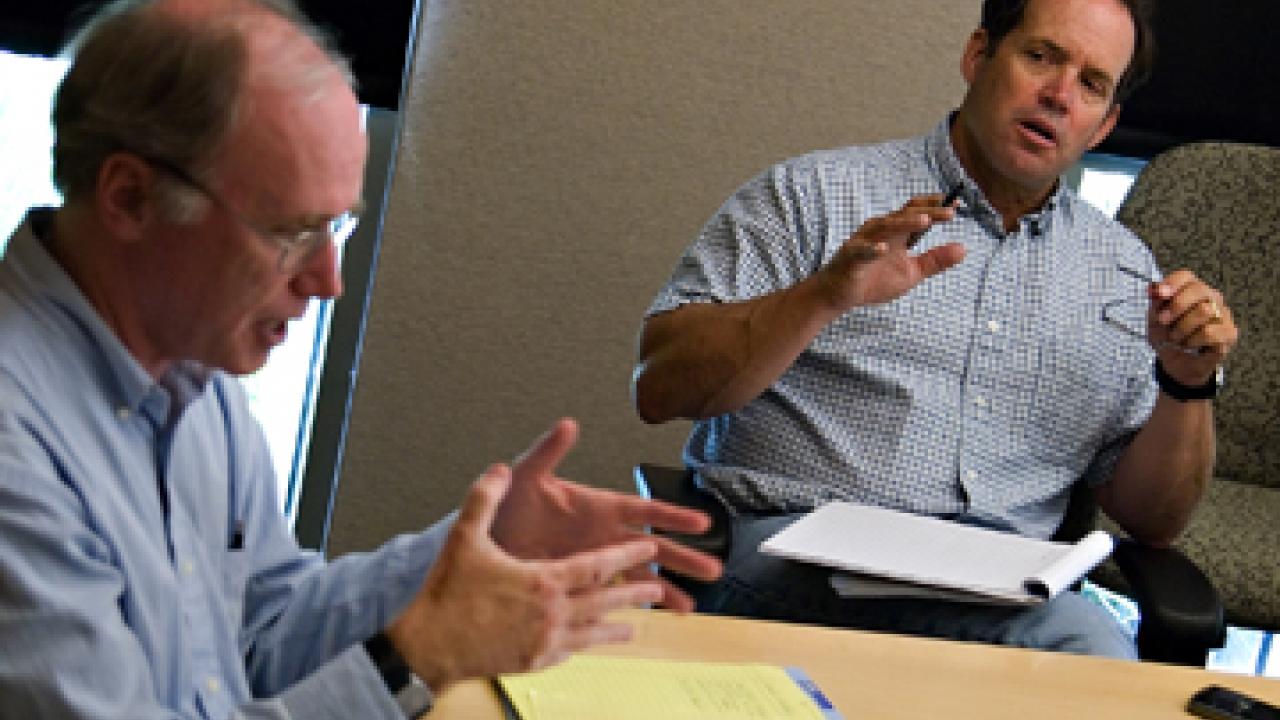Just one year ago, scientists from UC Davis and the nonprofit Public Policy Institute of California warned of looming disaster in the Sacramento-San Joaquin Delta -- an upheaval that could affect the supply of water, food, energy and transportation for most people living in California.
Today, thanks to generous support from the Stephen Bechtel Fund and the David and Lucile Packard Foundation, those same UC Davis scientists have launched a new, five-year, $5 million project to produce the technical solutions and policy recommendations for avoiding such a catastrophic failure.
"The major delta planning efforts under way at the state level will be complex and politically charged for years to come," said Jeff Mount, a scientist who directs the Center for Watershed Sciences. "The Delta Solutions Project can help those efforts by developing objective, independent analyses and alternatives.
"This funding will help us sort out alternatives and trade-offs as the state grapples with its most difficult water supply and ecosystem management issue."
The Center for Watershed Sciences, a program of UC Davis' John Muir Institute of the Environment, was created 10 years ago to address great societal challenges, such as the Delta Solutions Project, which require a collective expertise from across the campus, said institute Director Deb Niemeier.
"The watershed sciences center and other centers in the John Muir Institute are specifically established to foster collaborations among teams of researchers whose expertise is essential for addressing one or more aspects of a problem, but who might not ordinarily be pulled together," Niemeier said. Financial support from organizations such as the Bechtel Fund "makes a huge difference in our ability to conduct this type of interdisciplinary research, which directly addresses important California issues," she added.
UC Davis' Delta Solutions Project will produce its reports and analyses for policymakers in cooperation with the Public Policy Institute of California. Among other things, the project will clarify the benefits and shortcomings of delta alternatives. This work is the cornerstone initiative in the watershed center's California Water Program, a long-term research effort supporting the development and dissemination of innovative solutions to California's water resource issues.
Jay Lund, the UC Davis engineering professor who helped develop a comprehensive computer model of the state's water system, said: "Our team wants to enable the best long-term solutions to emerge. We want to help transform years of complex delta research into the confidence to move forward."
Others involved in the effort include professors Peter Moyle of Wildlife, Fish and Conservation Biology; Richard Howitt, chair of Agricultural and Resource Economics; and researchers William Fleenor of Civil and Environmental Engineering, and William Bennett of the John Muir Institute.
Specifically, the Delta Solutions Project's scientists, engineers and economists will:
• Evaluate the environmental, economic and water supply performance of delta alternatives;
•Develop analytical tools, including computer models, to inform and improve ongoing strategic planning efforts and to assist in developing technical solutions to design, operations and ecosystem-restoration problems;
• Engage key government and nongovernment decision makers, as well as news media, and stay involved in delta outreach and education solutions for the long term; and
• Teach the graduate students and research staff who will become the next generation of staff members for California agencies, water contractors, consultants and nongovernment organizations.
This summer, the Delta Solutions Project team and the Public Policy Institute will publish a follow-up report to last year's "Envisioning Futures for the Sacramento-San Joaquin Delta."
The new report, "Comparing Futures for the Sac-ramento-San Joaquin Delta," will provide a general decision framework and evaluation for the most fundamental issue facing the delta: whether to build a water-transfer facility, sometimes called a peripheral canal, that would carry water from the Sacramento River around the delta and deliver it to San Joaquin Valley farms, and cities in the Bay Area and southern California.
"In the course of evaluating the various alternatives for the delta, we have grown to appreciate the complexity of this system," said Mount. "The future is uncertain and the stakes for California are very high, but we think we have a handle on some ways forward."
Suanne Klahorst is a writer for the John Muir Institute of the Environment, and Sylvia Wright is a senior public information representative for the UC Davis News Service.
Media Resources
Dave Jones, Dateline, 530-752-6556, dljones@ucdavis.edu
